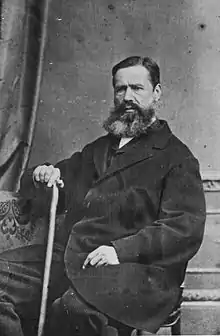Hugh Carleton
Hugh Francis Carleton (3 July 1810 – 14 July 1890) was New Zealand's first member of parliament.
Hugh Carleton | |
|---|---|
 Hugh Francis Carleton in ca 1870s | |
| 2nd Chairman of Committees | |
| In office 1856–1870 | |
| Preceded by | Frederick Merriman |
| Succeeded by | Maurice O'Rorke |
| Member of the New Zealand Parliament for Bay of Islands | |
| In office 1853–1870 | |
| Preceded by | New constituency |
| Succeeded by | In abeyance (title next held by Richard Hobbs) |
| Personal details | |
| Born | 3 July 1810 Ireland |
| Died | 14 July 1890 (aged 80) London |
| Spouse(s) | Lydia Jane Williams, youngest daughter of the missionary Henry Williams |
| Relations | Henry Williams (father-in-law) |
Early life
Carleton was born in 1810. He was the son of Francis Carleton (1780–1870) and Charlotte Margaretta Molyneux-Montgomerie (d. 1874). Hugh Carleton, 1st Viscount Carleton was the brother of his grandfather, John Carleton. His family was living in Clare, County Tipperary and then Greenfield, County Cork, Ireland.[1] He was educated at Eton College and Trinity College, Cambridge.[2] He studied law in London, then art in Italy.[2]
Career as a journalist in New Zealand
He settled in the Bay of Islands in 1842.[1] On 30 November 1859, he married Lydia Jane Williams, youngest daughter of the missionary Henry Williams and Marianne Williams; they had no children.[3][4]
He became a journalist in Auckland and edited the New Zealander then established the Anglo-Maori Warder, which followed an editorial policy in opposition to Governor George Grey. In 1856 he became the editor of the Southern Cross.[2]
Career as a member of parliament
| Years | Term | Electorate | Party | ||
|---|---|---|---|---|---|
| 1853–1855 | 1st | Bay of Islands | Independent | ||
| 1855–1860 | 2nd | Bay of Islands | Independent | ||
| 1861–1866 | 3rd | Bay of Islands | Independent | ||
| 1866–1870 | 4th | Bay of Islands | Independent | ||
He was a member of New Zealand's first, second, third, and fourth Parliaments, representing the Bay of Islands electorate from 1853 to 1870,[3] when he was defeated.[5] Due to the system of staggering used in the first general election, Carleton was actually the first MP ever elected in New Zealand (though he was elected unopposed), hence he liked to be called the Father of the House.[6][7]
Carleton was the second Chairman of Committees, succeeding Frederick Merriman on 17 April 1856,[8] i.e. just after the opening of the first session of the 2nd Parliament.[9] He remained Chairman of Committees until he left Parliament in 1870.[8]
He had a strong interest in parliamentary procedure, and unsuccessfully lobbied for the position of Speaker. He is known for his unsuccessful campaign against the availability of alcoholic beverages at Bellamy's, the parliamentary restaurant. He was also a critic of the idea that all voting districts should contain the same number of voters, saying that this system gave "a preponderating control" of the political world to one specific class. He was described as "scholarly" by his allies and "pedantic" by his critics.
England
Carleton returned to England and spent the last ten years of his life there.[6] He died at Lewisham, Surrey, England, on 14 July 1890.[3][10]
His wife Lydia died in Napier, New Zealand on 28 November 1891.[11][12][13][14][15]
Publications
- Carleton, Hugh (1874) - The life of Henry Williams, Archdeacon of Waimate. Auckland NZ. Online available from Early New Zealand Books (ENZB).
Notes
- Mennell, Philip (1892). . The Dictionary of Australasian Biography. London: Hutchinson & Co – via Wikisource.
- Fitzgerald, Caroline (2011). Te Wiremu: Henry Williams – Early Years in the North. New Zealand: Huia Publishers. p. xii. ISBN 978-1-86969-439-5.
- Silver, D. B. "Carleton, Hugh Francis". Dictionary of New Zealand Biography. Ministry for Culture and Heritage. Retrieved 5 April 2011.
- "Married". Daily Southern Cross. Vol. XVI, no. 1277. 9 December 1859. p. 3. Retrieved 20 August 2012.
- Wilson 1985, p. 188.
- Littlejohn, Charles Philip (23 April 2009) [First published in 1966]. "Carleton, Hugh Francis". In McLintock, A. H. (ed.). An Encyclopaedia of New Zealand. Ministry for Culture and Heritage / Te Manatū Taonga. Retrieved 27 September 2013.
- "The Southern Cross". Daily Southern Cross. Vol. XI, no. 721. 26 May 1854. p. 2. Retrieved 1 August 2015.
- Wilson 1985, p. 251.
- Wilson 1985, p. 139.
- "New Zealand Mail Issue 967". Paperspast.natlib.govt.nz. 12 September 1890. p. 16. Retrieved 15 January 2022.
- https://paperspast.natlib.govt.nz/newspapers/NZMAIL18911211.2.79?end_date=01-01-1892&items_per_page=10&query=Carleton&snippet=true&start_date=24-11-1891&type=ARTICLE
- https://paperspast.natlib.govt.nz/newspapers/DTN18911128.2.4?end_date=01-01-1892&items_per_page=10&query=Carleton&snippet=true&start_date=24-11-1891&type=ARTICLE
- https://paperspast.natlib.govt.nz/newspapers/NZH18911204.2.3?end_date=01-01-1892&items_per_page=10&query=Carleton&snippet=true&start_date=24-11-1891&type=ARTICLE
- "Deaths. , Deaths". New Zealand Times. 4 December 1891. p. 2.
- "Deaths. , Deaths". Taranaki Herald. 5 December 1891. p. 2.